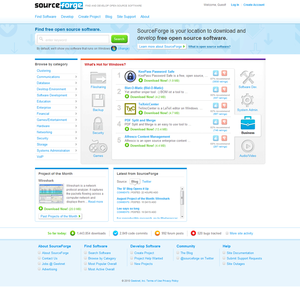SourceForge
 |
|
| URL | http://sourceforge.net/ or http://sf.net/ |
|---|---|
| Commercial? | Yes |
| Type of site | Collaborative revision control and software development management system |
| Registration | Optional (required for creating and joining projects) |
| Owner | Geeknet (Formerly VA Software and SourceForge, Inc.) |
| Created by | VA Software |
| Launched | November 1999 |
| Alexa rank | 158 (January 2010[update])[1] |
| Current status | Active |
SourceForge is a web-based source code repository. It acts as a centralized location for software developers to control and manage open source software development. The website is operated by Geeknet[2] and runs a version of SourceForge Enterprise Edition, forked from the last open-source version available. As of February 2009[update], the SourceForge repository hosts more than 230,000 projects and has more than 2 million registered users,[3] although not all are active. The domain sourceforge.net attracted at least 33 million visitors by August 2009 according to a Compete.com survey.[4]
SourceForge offers free access to hosting and tools for developers of free / open source software, competing with other providers such as RubyForge, Tigris.org, BountySource, Launchpad, BerliOS, JavaForge and GNU Savannah.
Contents |
Features
Project developers have access to centralized storage and tools for managing projects, although it is best known for providing revision control systems such as CVS, SVN, Bazaar, Git or Mercurial.[5] Major features (amongst others) include project wikis, metrics and analysis, access to a MySQL database, and unique sub-domain URLs (such as http://project-name.sourceforge.net).
The vast number of users at SourceForge.net (over 2,000,000 as of 2009[6]) exposes prominent projects to a variety of developers, and can create a positive feedback loop. As a project's activity rises, SourceForge.net's internal ranking system makes it more visible to other developers who may join and contribute to it. Given that many open source projects fail due to lack of developer support, exposure to such a large community of developers can continually breathe new life into a project.
Developers must agree to grant SourceForge.net a perpetual license before they can host code on its servers.[7] SourceForge.net uses Trove Categorization for its projects.
Temporary bans in China
The entire SourceForge.net website was banned in China around 2002,[8] though the ban was later lifted in 2003.
Sourceforge.net was again blocked for about a month (June 26, 2008 – July 24, 2008).[9][10][11] The Moonlight Blog suggests this might be related to the "Boycott Beijing 2008" banner placed on Notepad++'s SourceForge.net homepage.[9]
Banned countries and controversy
In its terms of use,[12] SourceForge states that its services are not available to users in countries on the sanction list of the U.S. Office of Foreign Assets Control (including Cuba, Iran, North Korea, Sudan and Syria). Since 2008, access to the secure server (used for making contributions to the site) was blocked for people from those countries. As of January 2010[update], all access including downloads is blocked for those users. This means that all people whose IP addresses appear to belong to those countries are prevented from using the site.[13]
These restrictions have drawn criticism as being counter to the free software movement, the open source software movement and the principles of making software available to all without discrimination.[14]
Suit by SPPF
Société civile des Producteurs de Phonogrammes en France is an umbrella group for a variety of organizations in France. In November, 2008, SPPF initiated a suit against Sourceforge.net, Vuze, Limewire, and Morpheus for hosting P2P file-sharing application Shareaza that "facilitates mass copyright infringement".[15] SourceForge is not sued for hosting copyrighted material itself.
See also
- Comparison of open source software hosting facilities
- Société civile des producteurs phonographiques
References
- ↑ "sourceforge.net - Site Information from Alexa". http://www.alexa.com/data/details/main/sourceforge.net. Retrieved 2010-01-25.
- ↑ Formerly VA Software, who re-named itself after SourceForge before re-branding to GeekNet in 2009
- ↑ "What is SourceForge.net?". http://sourceforge.net/apps/trac/sourceforge/wiki/What%20is%20SourceForge.net. Retrieved 2009-08-01.
- ↑ Sourceforge attracts almost 40m visitors yearly
- ↑ Sourceforge.net
- ↑ "What is SourceForge.net?". http://apps.sourceforge.net/trac/sourceforge/wiki/What%20is%20SourceForge.net?.
- ↑ "Terms and Conditions of Use". SourceForge.net. SourceForge, Inc.. 2000-05-13. http://apps.sourceforge.net/trac/sitelegal/wiki/Terms%20of%20Use. Retrieved 2008-05-13. "By submitting, posting or displaying Content on or through SourceForge.net, you grant company a worldwide, non-exclusive, irrevocable, perpetual, fully sublicensable, royalty-free license to use, reproduce, adapt, modify, translate, create derivative works from, publish, perform, display, rent, resell and distribute such Content (in whole or part) on SourceForge.net and incorporate Content in other works, in any form, media, or technology developed by company, though company is not required to incorporate Feedback into any company products or services. Company reserves the right to syndicate Content submitted, posted or displayed by you on or through SourceForge.net and use that Content in connection with any service offered by company."
- ↑ "China says asta la vista to Altavista". vnunet.com. 2002-09-06. http://www.vnunet.com/vnunet/news/2119983/china-asta-la-vista-altavista. Retrieved 2007-12-04.
- ↑ 9.0 9.1 SourceForge Blocked In China. Moonlight Blog. June 26, 2008.
- ↑ SourceForge Unblocked in China. Moonlight Blog. July 24, 2008.
- ↑ Gamedev.net
- ↑ Sourceforge.net terms of use
- ↑ Sourceforge blog clarification for denial of access
- ↑ Blog entry discussing country-wide blocks
- ↑ Record Labels to Sue Vuze, Limewire and SourceForge
External links
- SourceForge.net
- "The SourceForge Story", by James Maguire (2007-10-17)
|
||||||||||||||||||||||||
